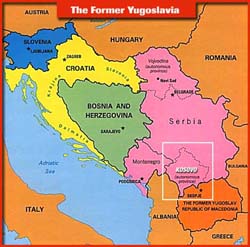Serbs, Albanians discuss Kosovo's future in Vienna
Serb and ethnic Albanian negotiators sized up each other's positions Monday at the start of long-awaited U.N.-mediated talks on the future status of Kosovo. The two-day talks at Vienna's Daun-Kinsky Palace began a concerted attempt by major Western powers to resolve one of the toughest disputes left from the 1990s ethnic conflicts of the Balkans, whether the province of Kosovo should be independent or remain part of Serbia-Montenegro.

The morning session of the closed-door meetings appeared to have gone smoothly. "The discussions are very frank," a U.N. official who was not authorized to speak to the media, told The Associated Press on condition of anonymity. "There was no blood on the floor and nobody walked out," the official said after the morning session.
Before the talks started, the Kosovo team's leader Lutfi Haziri, the province's minister of local government, had made his position clear: "We want to resolve the status as soon as possible. Independence is coming."
Ethnic Albanians, who comprise about 90 percent of the province's population of 2 million, want outright independence. Serbia insists on retaining some control over the region, which it considers an integral part of the nation and the birthplace of its national identity centuries ago.
The United Nations has administered the province since 1999, after NATO launched air attacks to stop a crackdown on independence-minded ethnic Albanians by President Slobodan Milosevic's Serb forces. Thousands of people died and hundreds of thousands were displaced during that war, and the end of hostilities did not bring the two sides any closer to a resolution.
At Monday's talks, representatives of Kosovo's ethnic Albanians sat next to U.N. mediators on one side of a table draped with green cloth. Across the table were representatives of Serbia's government and Kosovo's Serb minority. A senior Austrian diplomat, Stefan Lehne, represented the EU, and the United States sent a junior diplomat as an envoy.
The scheduled start of the talks was delayed for over a month, following the Jan. 21 death of Kosovo President Ibrahim Rugova, who had put the province on the path to statehood. The Vienna talks, the first stage in the status-talks process are discussing the nuts-and-bolts of local government reform to lay the groundwork for further talks.
After Monday's evening session, the participants will attend a reception. They talk again Tuesday morning and are expected to hold a news conference in the afternoon. The overall process is being mediated by former Finnish President Martti Ahtisaari, who was appointed by the United Nations to steer the talks toward an agreement, preferably by the end of this year. Ahtisaari's deputy, Albert Rohan, is chairing the current session.
"Any future settlement is about minority rights and safety," said Hua Jiang, Ahtisaari's spokeswoman. She said the entire process was "about setting up a multiethnic society in Kosovo." Diplomats from the so-called Contact Group, the United States, Britain, Germany, France, Italy and Russia, have already agreed on a set of guidelines for Kosovo's future.
Those rules say the province cannot return to its previous status under direct Serb rule, be partitioned along ethnic lines or be joined to another country in the region, such as Albania. They also stipulate that any agreement should be acceptable to the province's ethnic Albanians, reports the AP.
N.U.
Subscribe to Pravda.Ru Telegram channel, Facebook, RSS!





